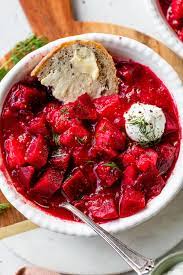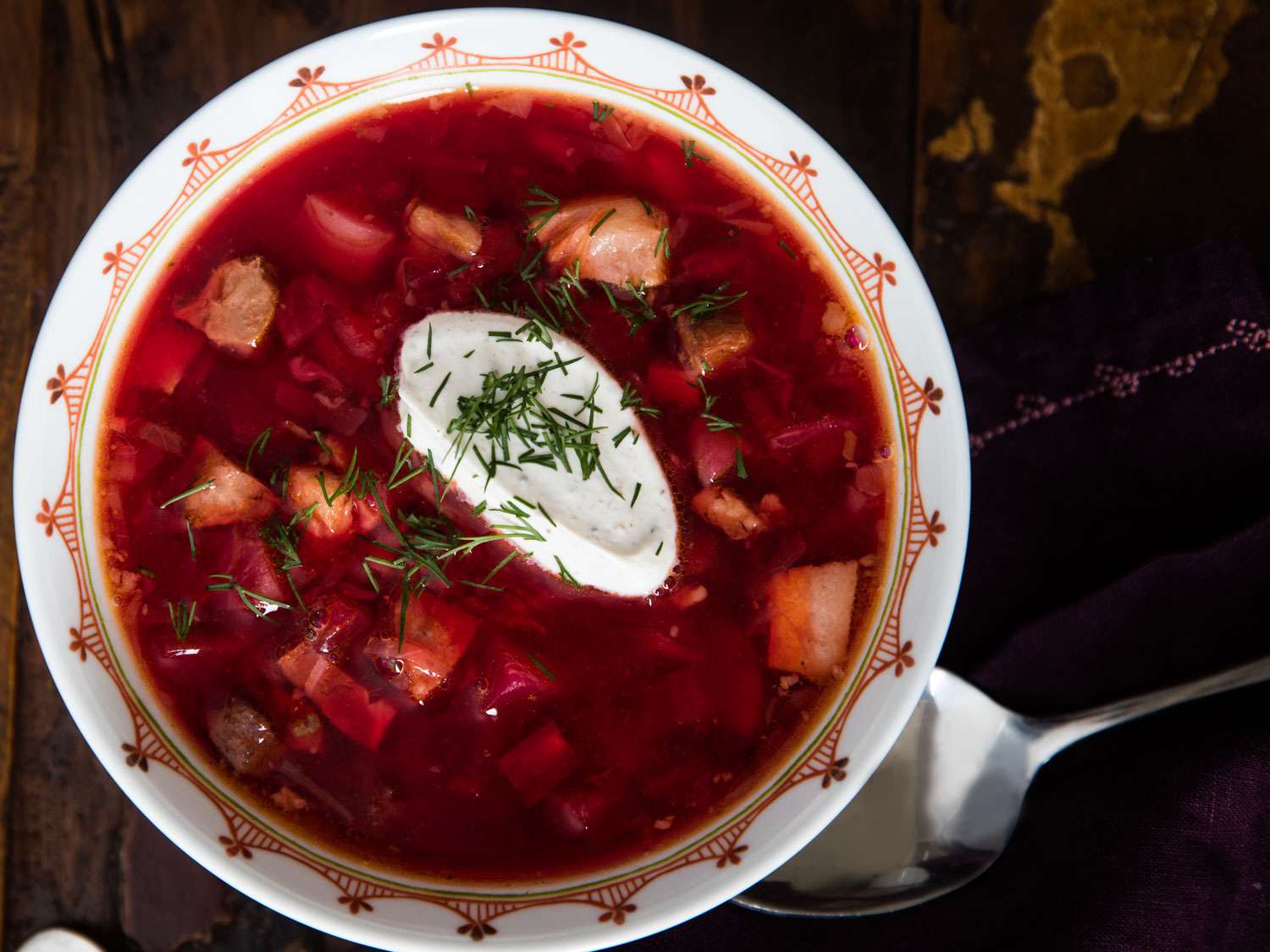
Discover the rich culinary heritage of Belarus with our Belarus borscht recipe. This traditional Eastern European soup, known for its vibrant color and unique sweet and sour flavor, is a hearty and nutritious delight. Learn how to create this comforting dish, featuring a blend of beets, potatoes, cabbage, carrots, onions, garlic, and your choice of beef or pork. Our step-by-step guide ensures that you can easily prepare this beloved dish in your own kitchen. Whether you're exploring regional cuisine or seeking a comforting winter meal, Belarus borscht is sure to impress. Dive into this flavorful journey and master the art of this classic soup today.

Here is a step-by-step recipe for making Belarus borscht:
Ingredients:
1- 1 pound beef or pork, cut into small cubes
2- 4 medium-sized beets, peeled and grated
3- 1 large potato, peeled and diced
4- 1 cup shredded cabbage
5- 2 medium-sized carrots, peeled and grated
6- 1 medium-sized onion, chopped
7- 2 cloves garlic, minced
8- 2 tablespoons vegetable oil
9- 1 tablespoon tomato paste
10- 1 tablespoon sugar
11- 2 tablespoons white vinegar
12- Salt and pepper to taste
13- Sour cream and fresh dill for garnish
Instructions:
1- In a large pot, heat the vegetable oil over medium heat. Add the chopped onions and minced garlic and sauté until softened, about 5 minutes.
2- Add the cubed beef or pork and brown on all sides, stirring occasionally.
3- Add the grated beets, diced potatoes, shredded cabbage, and grated carrots to the pot. Stir to combine.
4- Add enough water to cover the vegetables and meat, about 8-10 cups. Bring the soup to a boil and then reduce heat to medium-low. Simmer for 1-2 hours until the meat is tender and the vegetables are cooked through.
5- In a small bowl, whisk together the tomato paste, sugar, and white vinegar. Add the mixture to the pot and stir to combine. Season with salt and pepper to taste.
6- Serve the soup hot, garnished with a dollop of sour cream and fresh dill.
Notes:
1- You can adjust the amount of sugar and vinegar to your liking. Some people prefer their borscht to be more sour or more sweet.
2- Borscht can be made vegetarian by omitting the meat and using vegetable broth instead of water.
3- This recipe makes a large batch of soup, perfect for feeding a crowd or for leftovers throughout the week.
Nutrition Facts (per serving):
- Calories: 352
- Total Fat: 18g
- Saturated Fat: 5g
- Cholesterol: 60mg
- Sodium: 315mg
- Total Carbohydrates: 26g
- Dietary Fiber: 6g
- Sugars: 13g
- Protein: 24g

1 pound beef or pork, cut into small cubes:
- Calories: Approximately 700-800 calories (varies with meat type)
- Protein: Approximately 70-80 grams
- Fat: Approximately 45-55 grams
- Carbohydrates: 0 grams
- Sodium: Varies depending on seasoning and cut of meat
benefits:Provides high-quality protein, essential amino acids, and various vitamins and minerals such as iron, zinc, and B vitamins, which are important for overall health and muscle function.
4 medium-sized beets, peeled and grated:
- Calories: Approximately 140-160 calories
- Protein: Approximately 4-5 grams
- Fat: Approximately 0.5 grams
- Carbohydrates: Approximately 30-35 grams
- Sodium: Approximately 160-200 milligrams
benefits:Rich in antioxidants like betalains and vitamin C, beets can help reduce inflammation, support digestion, and boost immunity. They also contain folate, manganese, and potassium.
1 large potato, peeled and diced:
- Calories: Approximately 150-180 calories
- Protein: Approximately 2-3 grams
- Fat: Approximately 0.2-0.4 grams
- Carbohydrates: Approximately 35-40 grams
- Sodium: Approximately 10-20 milligrams
benefits:A good source of vitamin C, potassium, and fiber, potatoes can aid in digestion, support heart health, and provide energy. They also contain antioxidants like flavonoids.
1 cup shredded cabbage:
- Calories: Approximately 20-25 calories
- Protein: Approximately 1-2 grams
- Fat: Approximately 0 grams
- Carbohydrates: Approximately 5-6 grams
- Sodium: Approximately 15-20 milligrams
benefits:High in fiber, vitamins C and K, and antioxidants, cabbage can help improve digestion, reduce inflammation, and support heart health. It's also low in calories.
2 medium-sized carrots, peeled and grated:
- Calories: Approximately 50-60 calories
- Protein: Approximately 1-2 grams
- Fat: Approximately 0.3 grams
- Carbohydrates: Approximately 12-14 grams
- Sodium: Approximately 60-70 milligrams
benefits:Packed with beta carotene, fiber, and vitamins A and K, carrots promote eye health, improve digestion, and boost immunity. They also contain antioxidants like lutein.
1 medium-sized onion, chopped:
- Calories: Approximately 40-50 calories
- Protein: Approximately 1-2 grams
- Fat: Approximately 0 grams
- Carbohydrates: Approximately 10-12 grams
- Sodium: Approximately 2-3 milligrams
benefits:Rich in antioxidants and sulfur-containing compounds, onions can help reduce inflammation, improve heart health, and support digestion. They also contain vitamin C and fiber.
2 cloves garlic, minced:
- Calories: Approximately 10-15 calories
- Protein: Approximately 0.5 grams
- Fat: Approximately 0 grams
- Carbohydrates: Approximately 2-3 grams
- Sodium: Approximately 1-2 milligrams
benefits:Known for its antimicrobial and anti-inflammatory properties, garlic can help boost immunity, improve heart health, and support digestion. It also contains vitamins C and B6.
2 tablespoons vegetable oil:
- Calories: Approximately 240-240 calories
- Protein: 0 grams
- Fat: Approximately 28 grams
- Carbohydrates: 0 grams
- Sodium: 0 milligrams
benefits:Provides healthy fats and vitamin E, vegetable oil can help lower cholesterol, reduce inflammation, and support heart health. It's important to choose a healthy option like olive or avocado oil.
1 tablespoon tomato paste:
- Calories: Approximately 10-15 calories
- Protein: Approximately 0.5 grams
- Fat: Approximately 0 grams
- Carbohydrates: Approximately 2-3 grams
- Sodium: Approximately 15-20 milligrams
benefits:Rich in lycopene, a powerful antioxidant, tomato paste can help reduce the risk of certain cancers, improve heart health, and support skin health.
1 tablespoon sugar:
- Calories: Approximately 49 calories
- Protein: 0 grams
- Fat: 0 grams
- Carbohydrates: Approximately 12.6 grams
- Sodium: Approximately 0 milligrams
benefits:Provides quick energy, but should be consumed in moderation to avoid negative health effects such as weight gain and increased risk of diabetes.
2 tablespoons white vinegar:
- Calories: Approximately 2-3 calories
- Protein: 0 grams
- Fat: 0 grams
- Carbohydrates: Approximately 0.1 grams
- Sodium: Approximately 0 milligrams
benefits:May aid in digestion, help regulate blood sugar levels, and promote satiety when consumed in small amounts. It's also used in preserving foods.
Salt and pepper to taste:
- Salt and pepper's nutritional content is minimal and can vary based on personal preference.:
Sour cream and fresh dill for garnish:
- The nutritional content of garnishes like sour cream and dill can vary based on the amount used.
benefits:
- Sour cream: Contains calcium, vitamin D, and probiotics (if cultured), which can support bone health and gut health. However, it's high in saturated fat and calories, so should be consumed in moderation.
- Fresh dill: Contains antioxidants and vitamins A and C, fresh dill can help reduce inflammation, support digestion, and boost immunity. It also adds flavor to dishes without adding sodium or calories.
Keep in mind that the total nutritional content of your dish will depend on the specific quantities and preparation methods used.
Belarus borscht is a delicious and nutritious soup that is perfect for a cold winter day. It is a great way to incorporate vegetables and protein into your diet, and the sweet and sour flavors are sure to satisfy your taste buds.

Comments